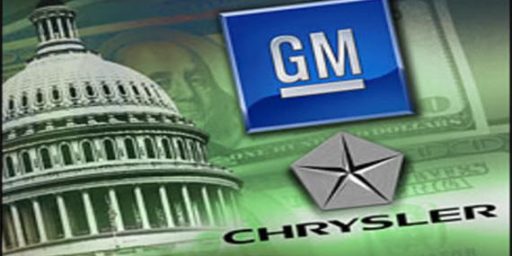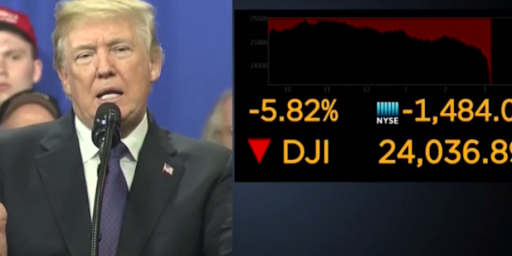Citigroup Below $5/Share
This could be a problem since many institutional investors and pension funds are barred from owning stocks below $5 dollars, and that could produce a massive sell-off of the stock that would further reduce the price.
“That’s the danger of crossing that $5 threshold,” says Owen Malcolm, senior vice president of Sanders Financial Management in Atlanta. “They’re (Citigroup) already in trouble. It could get worse.”
Money managers don’t necessarily have to sell Citi immediately. But they would have to get out before the end of the quarter if the stock doesn’t recover and may opt to do so now to mitigate potential losses.
Of course, I have no worries that Citigroup will be deemed too big to fail and they will get a boat load of money from the government, then go have a huge party in Hawaii. This is America dammit! And we prop up our losers.
“It’s getting to the point where it’s make-or-break time for Citigroup,” says Ryan Detrick, an analyst at Schaeffer’s Investment Research in Cincinnati. “It doesn’t look promising.”
For Citigroup, a Dow component and one of the world’s biggest financial institutions, the reversal in its stock price is stunning. The stock was trading at over $20 a month ago and $31 a year ago. It has plunged nearly 90 percent in nearly two years.
Citigroup shares have lost one-third of their value in the first three days of this week as investors worried that Pandit’s plan to cut expenses by 20 percent and eliminate 52,000 jobs won’t restore the bank to health.
Citigroup has lost $20.3 billion in the last year and taken tens of billions of dollars of writedowns on mortgage and other toxic debt. Analysts expect it to lose money in the fourth quarter, and some don’t expect it to be profitable in 2009.
Once again, the problem with bailing out companies that are “too big to fail” is that not only does it send a message to the upper management of that company, but to all companies, that their irresponsible behavior will be tolerated. That they can take risks they otherwise might not and not have to face the conseuqences.
I have to say this is rather amusing in a grim sort of way. Quite a few supported the bailout which was supposed to prevent this very thing. We have Citigroup teetering on the edge of disaster. Bank of America is down to $11.25/share whereas a year ago the price per share was over $40. Morgan Stanley is down to $9.20/share from over $50 a year ago. Goldman Sachs is down to $52/share down from $200/share. The $700 billion was supposed to stop this. But now we see it isn’t working. We’ve basically wasted $700 billion. To those who supported the bailout, what should we do now? Wait let me guess…another $700 billion?





I think we’ve only wasted about $400 billion to date, so the answer to your question should be to cut off the supply to the top, because we’re probably going to need it to keep people from dying at the bottom.
How is a falling stock price per se a problem for Citigroup, Steve? I know it’s a problem for Citigroup stockholders which, of course, includes Citigroup’s top management. But how is it a problem for the company?
What’re are you going to do? None of us particularly wants to end up looking like Japan in the 1990s, and that’s when they sat on their asses instead of trying to bailout the financial system for 8 years after the massive Nikkei crash. Whether or not that’s applicable in this case is another story, but the principal authorities are using that and the Great Depression example as a reason to do this.
That said, they really ought to break up Citibank or something like it – the reason these banks are “too big to fail” is because they get massive to the point where one of them getting the Chapter 7 treatment can drive the US financial system into crazy land.
Brett,
The Japanese tried to get out of that mess. They had a much stronger command-n-control view of their economy than we have ever had. The idea they just did nothing is completely false.
Dave,
I think the whole problem is that right now people see Citigroup as on the brink of failure. If financial insitution is seen as being on the brink of failure people are not going to trust it with their cash, thus quite possibly, bringing about exactly what they feared. The low stock price is a symptom, but also a signal to investors. Having it drop down to really, really low levels would be a bad signal.
Apparently Citigroup thinks the dropping share price is a problem.
I think it is safe to say we have a company with a failed business plan. But yet we want to keep it going. We want a loser to stay in business. We want bad policies to stay in place. We want to keep pouring money into a bottomless pit.
The whole premise behind the bailout was to prevent a financial market meltdown. After watching things it sure looks like we are heading towards an Epic Fail.
Fire Christopher Cox.
Rescind the requirement for mark to market accounting. This was a dumb idea that predictably led to financial firms collapsing. There is absolutely no good reason for it.
Reinstate the uptick rule for short sellers. Investment rules should be for investor protection, not to make speculation easier.
Treasury should allow Fannie and Freddie to pay dividends on their preferred stock. This will add thirty some billion dollars in capital to bank balance sheets across the country.
Fed can cut interest rates further, all the way down to zero. The sooner this is done the better.
Raise income tax rates on the upper 5% of tax payers in the nation. With gas prices down and the cost of operating their private jets reduced they can afford to pay a little more in taxes.
The Japanese tried to get out of that mess. They had a much stronger command-n-control view of their economy than we have ever had. The idea they just did nothing is completely false.
This is true. Steve is angling for the Hoover model, not the Japanese one.
As of this morning…it don’t look like that’s the case. They are looking to auction off chunks or sell off the entire heap.
Question….when this financial crisis first started, I thought Citi was one of the few in good shape, ie buying up failed banks left and right. Whahappened?.
No, Hoover did lots of things too. Contrary to popular belief. For example, he brought back the Reconstruction Finance Corporation. However, contrary the Wikipedia entry it did damned little. The biggest thing that either prevented an economy from going into depression or got them out were two things,
1. Going of the gold standard,
2. Pursuing an inflationary monetary policy.
England was the first to abandon the gold standard and avoided most of the Great Depression. They had a recession, but nothing like what countries that tried to stay on the Gold Standard experienced. Those countries that stayed on the gold standard, the abandoned it started growing again in terms of economic activity.
Also Hoover would be much loved by many people today on the Left,
Yes, yes, I know your high school history books had it that Hoover did nothing.
And lets be quite f*cking clear here. Roosevelt’s policies, aside from abandoning the gold standard, did pretty much nothing too. The U.S. went off the gold standard in 1933, which means that Hoover and Roosevelt’s other policies were pretty much useless.
Here are some of Hoover’s other policies:
1. The Revenue Tax Act of 1930.
This increased taxes on people making over $6,000 annually ($90,000+ today). Sound like a candidate we know today?
2. Signed the Smoot-Hawley tariff.
Hoover pushed for other tariffs before he was president and secretary of commerce. Why? To help American workers, keep jobs here, etc. Sound like a candidate we know today?
More from Wikipedia,
Gee, this sounds like something that could have come from the modern Democratic playbook if you ask me. Volunteerism, legislative relief, keeping jobs at home, increasing taxes on the “rich”. Nevermind that the last two actually worsened the economic situation and the first two did damned little to counter it.
Yeah, well when you lose money every quarter for the past 4 it starts to look bad.